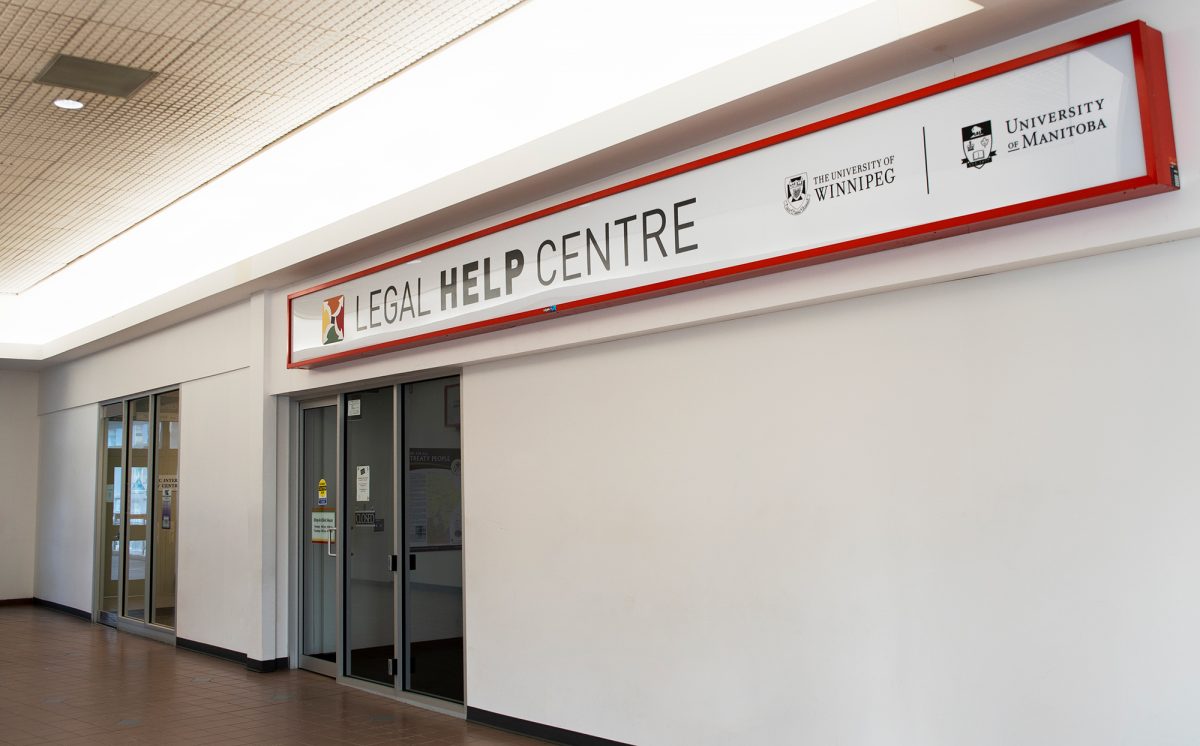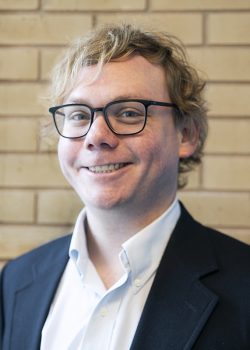
Legal Help Centre unites law students, alumni for common goals
Ten years of service to the community, pro bono services needed more than ever
As Winnipeg’s Legal Help Centre celebrates its 10th year, students and alumni of the University of Manitoba Faculty of Law, and members of the broader legal community have continued to work together throughout the pandemic to deliver critical legal services through virtual means to Manitobans.
Since 2011, the Legal Help Centre (the Centre) has connected individuals with social, economic and legal issues to appropriate services. The not-for-profit charity serves as a training ground for students who interact directly with clients, learning practical skills necessary for daily legal practice, with supervisory help from two staff lawyers plus a community of volunteer practicing lawyers.
Access to Justice
The love, patience, kindness, and encouragement you always showed me will be forever appreciated. My words alone can never express my appreciation for everything you have done… And I also wish you guys nothing but a win in your studies. You will make GREAT lawyers.”
– Legal Help Centre Client
The Centre arose out of the United Nations Commission on Legal Empowerment of the Poor and its 2008 report, “Making the Law Work for Everyone,” according to Paula Hamilton [LL.B./94], Executive Director of the Centre since 2017. Founders included various legal professionals, scholars from the University of Winnipeg and University of Manitoba and community members who identified gaps in providing access to justice for disadvantaged communities, Hamilton said. “The idea was to involve not just law school students, but to create an interdisciplinary model, because we recognize that legal problems often intersect with social and economic issues. They are complex issues that aren’t confined to the courtroom,” she said.
Board member and Acting Dean of the Faculty of Law, David Asper, Q.C. recalls the Centre’s development. “I was quite pleased to see that not only was it created to provide legal information, and in some cases, legal advice,” Asper said, “but it also contemplated the idea that people who have a problem may not actually have a legal problem in the sense of it being something that should be going to court, or require the intervention of lawyers. Also, law students could be involved and work with and alongside members of the legal profession. This was a win-win for everyone involved including the clients served, and still is!”
One of the main objectives, said Hamilton, was to address gaps in services which involved collaboration with other legal and community organizations to meet community needs. A key program has always been the in-person drop-in clinic that helps thousands annually, which, since the start of the pandemic, has successfully adapted to an online, virtual format.
The Centre also develops workshop presentations in response to common client questions to teach certain procedural matters, such as how to file a small claim, collect on a judgment or administer an estate.
Family law questions, however, are seen most frequently. In the event of a family breakdown, for example, a student often guides the client through the process, doing behind the scenes work such as drafting court documents, while the client remains on record as a self-represented litigant. The goal is to empower clients to handle their matter and appear in court for themselves, becoming better informed of their rights, more aware of the process, better prepared and more capable when they do so.
Learning by Doing
“Students are looking for ways to broaden their academic education. There’s nothing that helps you become a lawyer and article better than dealing with real people in real situations… Until you actually sit down with an individual and try to ask them questions and listen to their story, it’s just all theory.”
– Paula Hamilton [LL.B./94], Executive Director, Legal Help Centre
Currently, the Legal Help Centre Externship is a 12-credit, eight-month clinical experience open to a maximum of 10 students who devote a minimum of 14 hours each week for 12 consecutive weeks per term and get the chance to apply the knowledge and skills they have learned in the classroom. Students in any year not enrolled in the course can also sign up to be volunteers, and many do.
Currently, two full-time staff lawyers supervise the students, and a cadre of approximately 75 volunteer lawyers help with the mentoring process. Resources and experience are always on hand to ensure that the students are properly learning the practice of law while helping clients.
Hamilton, whose legal career included private and public practice, and work in the field of human rights, said being around law students has been her most positive experience so far. “They’re so keen, and they remind you of why you went to law school in the first place,” she said. “They want to learn skills, do good work and help people and you can influence them at the beginning of their careers to build on that concept and the value of serving people.”

Nadia Rumore, Legal Help Centre, senior staff lawyer.
Staff and volunteers have the opportunity to influence students’ attitudes and approaches beyond teaching hands-on skills. “We want students to learn listening skills and to have empathy towards the clients and their situations, and to develop the ability to collaborate with other disciplines – this is what it takes to help people solve complicated, multi-faceted problems in the real world,” stated Nadia Rumore, Senior Staff Lawyer [LL.B./05].
These skills translate to all practice areas, Rumore said, regardless of where students go on to work. Many students end up at private law firms, in-house legal departments or with government, but their experiences at the Centre will have helped develop their awareness of access to justice issues and marginalized people that they might never otherwise have encountered.
Theory and Practice
“It stands out among my learning experiences as highly positive, challenging, and rewarding.”
– Lauren Hidalgo, Legal Help Centre Externship student
Third-year law student Zara Kadhim first heard about the Centre during her second year from classmates who had taken the Externship and told her it was great exposure to applied learning “which is something we want more of in law school,” Kadhim said, “because there is a focus on theory. When I heard what was offered, it was really a selling point for me.”
Having developed an interest in human rights, labour and employment law, Kadhim jumped at the prospect of having client interaction: “. . . I wanted to get some experience talking to clients and meeting their needs efficiently.”
The most practical lessons Kadhim has learned include how to deal with difficult clients in the most professional way possible, maintaining a professional manner and identifying whether it is appropriate for the client to use the Centre’s services or whether they could benefit more from a referral to another helpful resource or service.
Lauren Hidalgo, a third-year student who started as a volunteer and then worked as a summer student, is now enrolled in the Externship program. Hidalgo said the experience was an instrumental part of her legal education where she applied classroom learning to a clinical setting. “I sharpened my skills in client management, client interviewing, and in explaining the law in plain language,” she said.
Alumni giving back
“When I retired from the bench after many years as a Judge, I wanted to stay connected to the profession of law and thereby continue to make a contribution to members of the public who find themselves in need of legal assistance or advice. The Legal Help Centre, with its dedicated staff and volunteer lawyers, is an effective and professional vehicle to accomplish these goals in the public interest, and I am very pleased to be a long serving member of its Board of Directors.”
– The Honourable Richard J. Scott [B.A./59, LL.B./63]
With only two staff lawyers on hand, volunteer lawyers are really appreciated, said Staff Lawyer, Douglas Ripley [JD/11]. While Rumore has extensive experience in Family Law, Ripley’s background is in Civil Litigation. “The issues our clients face are unpredictable and often multi-dimensional. The expertise provided by our team of volunteers ensures that our clients’ circumstances are thoroughly addressed,” said Ripley.

Douglas Ripley, Legal Help Centre staff lawyer.
During pre-pandemic drop-ins, at least two volunteer lawyers would always be present in the back room ready to answer any questions while the students did all the interacting with clients. “Volunteer participation provides a great opportunity for us as an organization to benefit from other resources and expertise,” said Ripley, “and it’s a chance for students to engage with other lawyers in the legal community.”
Besides networking with other community lawyers, Rumore added, lawyers get a chance to do pro bono work with clients who might never otherwise come to their firms for help. “It allows them to give back,” she said, “and they recognize the value in mentoring students.”
Lawyers donate their time knowing the benefits, said Rumore. “They love it,” she said, “because the students are dedicated to both their education and the community. The volunteer lawyers enjoy imparting their knowledge, but they also like to see the future of the profession.”
A graduate’s story
“There’s always going to be a need for lawyers within the community, But the idea that the practice of law was changing, and that there needs to be a greater emphasis on supporting organizations like the Legal Help Centre in delivering real grass-roots access to justice by those in private practice across the board – that was something that the Centre opened my eyes to in a huge way.”
– Gerrit Theule [JD/15]
Wolseley Law’s founding lawyer Gerrit Theule [JD/15] has been involved with the Centre since first starting law school, and has witnessed the impact the service has had on improving access to justice, and broadening the knowledge and experiences of both students and practicing professionals in the legal community.
Having come to law school at age 32 from a previous career, Theule knew that he wanted to set up his own community-based practice after graduation. Seeing a brochure for Pro Bono Students Canada in his first year, he knew the hands-on work it promised was exactly what he was craving. “I certainly went into law school knowing in the back of my mind that access to justice was a problem, but the really visceral day to day idea that there really is an access to justice crisis in the country, was something that is very real on a daily basis when you’re volunteering at the Centre,” he said.
Theule first volunteered, was hired as a summer student, took an internship for credit in his third year, and finally articled at the Centre. After his call to the bar, he did some contract work before opening his own community-based law firm. To this day he continues to be involved as a volunteer with drop-ins or to give educational presentations.
On a broad scale, Theule said the Centre opened his eyes to the big picture of legal practice, but he also learned the granular skills of how to be a lawyer. “It’s often said that law school doesn’t teach you how to be a lawyer, right? It teaches you a whole bunch of things, but it doesn’t actually teach you how to be a lawyer. This was an opportunity for me from first year to learn some of the skills that were going to be necessary.”
Today at Wolseley Law, three of the firm’s seven lawyers articled at the Centre, and almost all volunteer there on a regular basis. The firm just hired its first articling student who will start in the spring of 2021, and Theule confirmed that taking part in the Centre will be a part of their learning experience. “Because we came from the Legal Help Centre, [it] really formed the ethos of what we’re doing here,” Theule said.
Operating under pandemic conditions
“Clients have told me that they have only been able to access help because it was made available virtually. The format has opened the door to more Manitobans in rural or remote communities.”
– David Charach, Legal Help Centre Externship student
Despite the pandemic shutting down the Centre’s physical office and face-to-face operations, staff, students and volunteer lawyers continue to provide services. The important problem solving continues to take place – albeit virtually. Asper sees a silver lining to this restriction, however. “The idea that people have to physically come to a location means that they have to have the means and the ability to get there,” he said. “It also presupposes that people are in Winnipeg. The use of the remote technology is teaching the students how to communicate effectively, which can be difficult when you’re not actually sitting across from a person but it’s also giving the Centre the opportunity to extend its service beyond Winnipeg.”
Hamilton sees the advantages, but is careful to note that some clients without regular or reliable access to a computer or telephone could find virtual service challenging. “We find that meeting in person is often the best way to show that someone is caring and listening to your story or to develop trust,” she said. “However we are learning from the pandemic and strive towards service that is accessible and meaningful in a variety of ways.”
David Charach, a current Externship student in third-year law, was one of the first to experience an all-virtual clinic. While missing in-person interactions with coworkers and the connections normally made with clients in an office environment, he said the structure and processes put in place to continue operations have allowed him to develop. “The encouragement and support from staff and volunteers has been there all along, even though we have been physically separate,” Charach noted, adding, “in light of the circumstances everyone is facing right now, I appreciate the opportunity to meet the needs of clients.”
While the clinics are no longer technically a physical “drop-in” because the calls are scheduled, students “meet” with clients virtually and provide information and assistance required. Supervising lawyers are accessible through Zoom whenever they have questions.
The Centre is still busy, Hamilton observed, because life hasn’t stopped during COVID. “People still need help navigating a family breakdown or dealing with the loss of employment, a tenancy concern, or a debt issue. These kinds of concerns have become more significant, because a lot of people have lost their jobs or are experiencing additional financial hardship, stress and uncertainty,” she said.
It takes a community
“The more that we know each other and find ways to collaborate with each other, such as on access to justice issues where we’re not adversaries, but we’re colleagues actually trying to work together to improve a community problem, I think that probably helps the system overall to work better because it takes down barriers that might exist between among people who don’t know each other – older and younger alumni. I think that’s a very important aspect that sometimes gets overlooked.”
– Acting Dean David Asper, Q.C.
From his involvement with the Centre’s Board and this year of working for the Faculty as Acting Dean, Asper is especially struck by the many benefits arising from the way the Centre brings law students and alumni together to work towards a common goal. “I think it’s really important that our law school community stay as connected as possible,” he said, “not just for current students, but for alumni as well. Because we’ve got this big problem of access to justice, and the legal profession is expected to be a big contributor to how we try to address that.
“One of the things about being a lawyer,” he continued, “is that we’ve got to have a sense of corporate or social responsibility, and to give back to our communities, and this is a fantastic way to do it. Not only for the benefit of the community, but for our community to continue to build and strengthen bonds with each other.”






